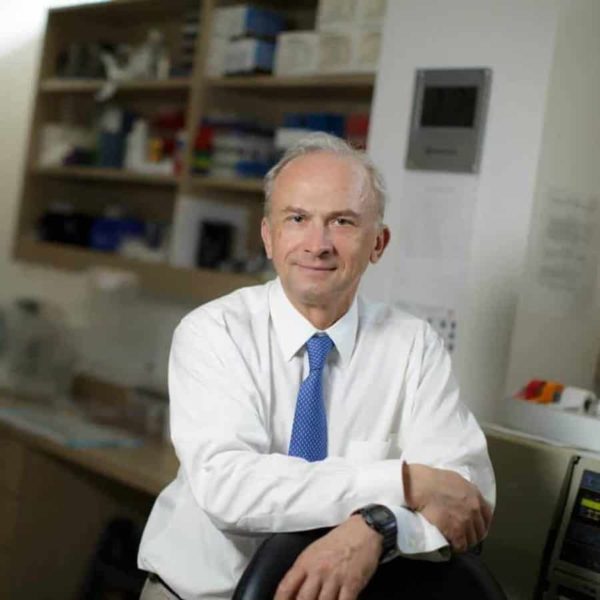As men age, their sexual function, vitality and strength can decline, but researchers had not yet established whether testosterone treatment is actually beneficial. Now, a team that included UF Health researchers has established testosterone’s benefits in a study published February 17 in the New England Journal of Medicine.
The paper examines the first three of seven trials in a long-term study called The Testosterone Trials, or the TTrials. In this first study, researchers analyzed the results of the first three trials, which examined sexual function, physical function and vitality, including mood and depressive symptoms, walking speed and walking distance.
The researchers found that the treatment increased the blood testosterone level from moderately low to mid-normal in men ages 19-40 and improved all aspects of sexual function, including sexual activity, sexual desire and the ability to get an erection.
“The study reinforced the results we expected to see, except for walking speed,” said Marco Pahor, M.D., the director of the UF Institute on Aging and a co-author of the paper.
In 2003, the Institute of Medicine reported there was not enough evidence to support a beneficial effect of testosterone in men who have low levels of the hormone. This report was the impetus for the TTrials, which are now the largest trials to examine the use of testosterone treatment in men 65 and older whose low testosterone levels can be attributed to age alone.
“The results of the TTrials show for the first time that testosterone treatment of older men who have unequivocally low testosterone levels does have some benefit,” said Peter J. Snyder, M.D., the principal investigator of the TTrials and a professor in the division of endocrinology, diabetes and metabolism at the University of Pennsylvania’s Perelman School of Medicine. “However, decisions about testosterone treatment for these men will also depend on the results of four other trials — Cognitive Function, Bone, Cardiovascular and Anemia — and the risks of testosterone treatment.”
Researchers screened 51,085 men and found 790 who had a sufficiently low testosterone level to be part of the study. The subjects were randomized into two groups: one that applied a daily testosterone gel and the other a daily placebo gel, for one year. The researchers evaluated participants at three, six, nine and 12 months, assessing their sexual function with questionnaires; physical function with questionnaires and the distance walked in six minutes; and vitality, mood and depressive symptoms using questionnaires.
Across the three trials, adverse events including heart attack, stroke, other cardiovascular events and prostate conditions were similar in men who received testosterone and those who received a placebo. However, the number of men in the TTrials was too small to draw conclusions about the risk of testosterone treatment.
“A larger and longer-term trial will be needed to have more definitive results regarding safety,” Pahor said. “However, this trial did not confirm earlier, smaller trials that raised serious concerns regarding cardiovascular safety.”
The TTrials were conducted at UF and the Perelman School of Medicine at the University of Pennsylvania as well as 11 other sites, including Albert Einstein College of Medicine, Baylor College of Medicine, Brigham and Women’s Hospital, Harbor-UCLA Medical Center, University of Alabama at Birmingham, Northwestern University Feinberg School of Medicine, Puget Sound Health Care System, University of California at San Diego School of Medicine, University of Minnesota School of Medicine, University of Pittsburgh School of Public Health and Yale School of Medicine.
The TTrials were supported by grant U01 AG030644 from the National Institute on Aging and the National Institutes of Health. The TTrials were also supported by the National Heart, Lung and Blood Institute; the National Institute of Neurological Diseases and Stroke; and the National Institute of Child Health and Human Development. AbbVie, formerly Solvay and Abbott Laboratories, also provided funding, AndroGel and placebo gel.



Suffering from low testosterone levels?
Pro Testosterone is a great product! My name is Jeff. I am 53 years old. Ive been using this supplement for almost a year now and Ive seen amazing results! My wife is much happier as well! Truly life changing product that saved my 25 year marriage!
I HIGHLY recommend it to anyone suffering from low testosterone levels!
Pro Testosterone is backed by proven herbal science. This is a completely natural supplement than can help you get over your low testosterone. Pro Testosterone was created by expert herbalists, combining ingredients long-used for their ability to address symptoms associated with low testosterone. Because the supplement is all natural, there are no side effects or downside to using this supplement. All you’ll get is the enhanced sense of well-being that comes with getting your testosterone levels back on track.
Click the link below to gain access to Exclusive Free Trial offer NOW!
http://tinyurl.com/ProTestosterone2016